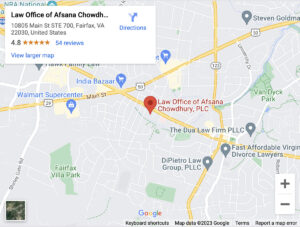
A legal separation is different in Virginia than in other states. In Virginia, there is no requirement for a signed, legal document that establishes that you and your spouse are separated. Instead, you become separated once you stop living together and have the intention that the separation be permanent. It is also possible to have an in-home separation where the spouses continue to live together for the well-being of the children or due to the financial difficulty of living apart.
Some couples live in separate residences but do not enter into a formal divorce because they fear divorce could harm their children emotionally.
Many spouses make the decision to live apart before making the final decision to divorce. Other spouses may stay married but separated for religious reasons. A Fairfax separation agreement lawyer from The Law Office of Afsana Chowdhury will review your situation and explain what is required to establish separation from your spouse.
Contact us today or call (703) 271-6519 for a case evaluation.
Virginia Separation Laws

In Virginia, a legal separation does not require a court order. In some states, couples must be legally separated by a court order, but in Virginia, the couple must simply “live apart.” Whether the couple chooses to separate pursuant to a separation agreement is up to them.
“Living apart” generally means a physical separation with at least one party having an intent to separate. There are, however, some unique cases where a couple may be considered separated even if living in the same house. In these “in-home separations,” the parties must generally understand the intent of at least one of the parties to separate, stop sleeping together, advise their families and close friends that they are separated, and generally stop acting as a married couple.
Does Separation Lead To Divorce?
Legal separation can lead to a divorce in two cases. It is grounds for divorce when a couple has either:
- Lived separate and apart for one year, or
- Lived separate and apart for six months if there are no minor children.
It is important to note that there is a distinction between “separation” and “desertion,” especially when it comes time for the couple to divorce. Desertion is a different ground for divorce, and it usually arises when one spouse leaves the marital home and completely abandons their marital duties, such as making regular payments, providing child support or child care, or otherwise failing to communicate with their spouse. Separation, on the other hand, tends to be more of a joint decision (even if one spouse is more inclined than the other), and typically the spouses will work out an arrangement to continue to co-exist and share obligations as needed.
Divorce From “Bed And Board”
Although there is no court order to establish a couple’s separation, decrees can be given for a divorce from “bed and board” but only under certain grounds: cruelty, reasonable apprehension of bodily hurt, willful desertion or abandonment. After obtaining a divorce from bed and board, a final divorce cannot be granted until one year from the date the alleged acts first took place if there are minor children involved, or six months if there are no minor children involved.
Most references to the word separation are based on the legal status of separation rather than a divorce from bed and board.
Separation Without A Marital Separation Agreement
Virginia spouses can separate without an agreement. Without a marital separation agreement, the couple will have to wait a full year before filing for divorce. Spouses can live apart or in the same house during the waiting period. The requirement of having the intent to end the marriage can be proven whether the couple lives apart or in the same residence but is much more difficult if they are living in the same residence.
Once the separation is established, a parent may seek legal custody, physical custody, visitation and child support in court. He or she does not have to wait to file these actions until the divorce complaint is filed. However, the spouses cannot obtain a division of the property until they enter into an agreement or until a divorce is filed.
Marital Separation Agreements
Couples can enter into an agreement on some or all of the unresolved family law matters while they are separated. An agreement on all the open issues is called a Marital Separation Agreement. A Marital Separation Agreement helps to expedite the divorce. Consider discussing your case with an experienced marital separation attorney to help protect your legal rights.
What To Know When Separating From Your Spouse
Spouses separate for many different reasons. If, however, you are separating with the intention of getting divorced, there are a few things to keep in mind.
First, be careful about dating while separated. Bear in mind that while separated, you are still legally married. In Virginia, adultery is not only a misdemeanor, but it also constitutes a individual ground for divorce according to Virginia Code Section 20-91. This could have more serious consequences in your future divorce proceedings and can impact the disposition of property, child custody, and spousal support arrangements.
Second, make sure to note the date of separation. There are serious legal consequences depending on when you formally separated. One way to establish a date of separation is to formalize a separation agreement. If you and your partner are not pursuing a separation agreement, you should be sure to announce your intention to move out and file for a divorce. This starts the clock for when you can legally pursue a divorce on the grounds of separation.
Contact A Fairfax Separation Agreement Lawyer For Advice
We want our clients to be fully informed. We want them to understand the legal consequences of their decisions and also the practical consequences. The Fairfax separation agreement lawyer at Law Office of Afsana Chowdhury will answer all your questions and explain all your options. Call us today at 703-782-4273 to schedule an initial phone consultation or schedule a consultation online.
Visit Our Family Law Office In Fairfax, VA
Chowdhury Divorce Law Group
10805 Main St STE 700A,
Fairfax, VA 22030
Phone: (703) 271-6519
Business Hours:
Monday: 9:00 AM- 5:00 PM
Tuesday: 9:00 AM- 5:00 PM
Wednesday: 9:00 AM- 5:00 PM
Thursday: 9:00 AM- 5:00 PM
Friday: 9:00 AM- 5:00 PM
Saturday: Closed
Sunday: Closed

Our family law firm in Fairfax, VA, also provides:
- Alimony Lawyer in Fairfax, VA
- Annulment Lawyers in Fairfax, VA
- Child Custody Attorney in Fairfax, VA
- Child Support Attorney in Fairfax, VA
- Contested Divorce Lawyer in Fairfax, VA
- Domestic Violence Lawyers in Fairfax, VA
- Gray Divorce Attorney in Fairfax, VA
- LGBT Divorce Attorneys in Fairfax, VA
- Military Divorce Lawyer in Fairfax, VA
- Modifications of Order Lawyers in Fairfax, VA
- Parental Alienation Attorney in Fairfax, VA
- Paternity Attorneys in Fairfax, VA
- Spousal Support Lawyers in Fairfax, VA
- Uncontested Divorce Attorney in Fairfax, VA


